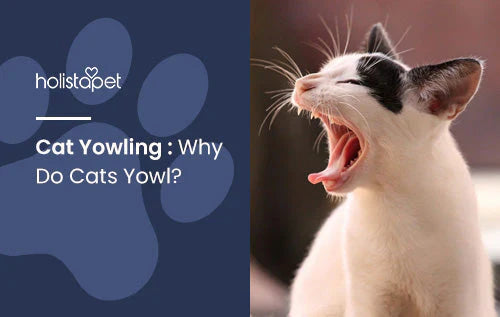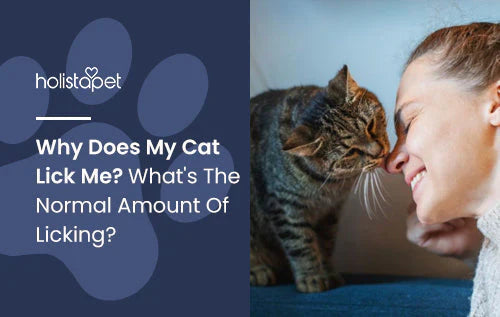Cats are quirky. They're funny. They do weird things. That's why we love them. But sometimes they can be hard to understand. It's hard to pinpoint why a cat suddenly starts to frequently meow. While cats will always be a bit of a mystery, there are definitely reasons for sudden yowling. And even better, there are most definitely ways, like using CBD oil, to make your cat yowl a bit less.
Why Is My Cat Meowing So Much?
All cats are individuals with their own personalities, likes, dislikes, and meowing habits. Some cats love to meow for what seems like no reason. There are also some cat breeds that are known for being more vocal. The general consensus is that Siamese, Oriental Shorthair, Burmese, Russian Blue, and Sphynx cats are very talkative kitties.
Normal vs. Excessive Yowling in Cats
Normal meowing is whatever amount of meowing you're used to hearing from your kitty. Excessive yowling is when your cat is meowing more than usual. Maybe their meows have not only become more frequent, but louder and longer. Maybe they won't stop excessively meowing until you get out of bed in the morning. If you start noticing more meowing or louder meowing, there may be something going on with your cat — and you definitely shouldn't ignore it!
Why Do Cats Cry or Yowl?
You notice your cat meowing a lot as it zips up and down the hall while you're trying to sleep. Your cat obsessively meows when anyone is in the kitchen, hoping it will lead to more food or treats. Or maybe your cat starts howling in the early morning, hoping to be your new alarm clock. Why is my cat crying? And why so loudly?
- To Get Your Attention: Cats don't meow at other cats — they communicate through body language, scent, and touch. To better communicate with humans, cats started meowing at us. Cats also sleep about 15 hours a day, meaning most of their activity is done at night. Since they are more energetic at night, they may meow more frequently than they do during the day.
- To Find a Mate: If you haven't got your male cat spayed, he might yowl to get the attention of female cats. Female cats will also yowl to let nearby male cats know they are open to mating.
- Intense or Sudden Pain: Although felines are notorious for concealing pain, they can't always hide it. Intense or sudden pain can cause a cat to vocalize its feelings. This type of yowling can be loud and it could be an indication of a serious injury.
- Old Age: Loud, frequent meowing becomes more common as cats age. This is especially true at night. Older cats can also suffer from diseases, some of which leave them in pain or discomfort.
- Anxiety & Change: Cats don't like change. They become attached to places and routines (like their litter box position), meaning a move, a new pet, or even a pet sitter can leave them quite upset. If they feel anxious or confused, your cat may start to meow more frequently.
Related: What Can I Give My Cat For Pain Relief?

How Do I Stop My Cat From Yowling?
While some kittens meow a lot naturally, it can be concerning when your cat suddenly becomes more vocal. Excessive meowing could occur from any of the reasons mentioned above. The first thing to do is to ensure that your cat is fixed, especially if their an elderly cat. Not only does this prevent unwanted kittens, but it's great for your cat's behavior and health.
You can also try giving your cat more attention — just not when they meow. Interact with your cat a bit more if you suspect they are lonely. This can be in the form of playing or just petting them while you're hanging out on the couch together. If you're not opposed to it, you can also allow your cat to be in your bedroom at night. You will probably notice a lot less meowing when your cat feels they are getting the attention they crave.
Related: Separation Anxiety in Cats: Signs and Symptoms
Don't Give In To Yowling
If you have a cat that meows excessively in the morning, try your hardest not to give in. Simply turn away and continue to sleep, even if it's just you scrolling through social media feeds or listening to a podcast. Your cat will start to learn after a few weeks that yowling at you to wake up won't get them what they want.
It's also important to not feed your cat every time they beg for food, no matter how adorable or annoying you find their behavior. Start feeding your cat at the exact same time every day, even using an automatic feeder. Overfeeding a cat can lead to obesity. It can also encourage them to keep meowing once they find out it's the magic button that provides them with more food.
Set A Routine
If you recently moved or added an extra cat to the home, you can make your cat feel more comfortable and confident by giving them a sense of routine. Feed them at the same time every day, play with them at the same time, and train them with treats around the same time.
If your cat is older, try putting night lights around the house. This could help them see a bit better in the dark if they are having eye issues. This will ensure that your elderly kitty isn't as disoriented, which can help cut back on their meowing habits.
Related: Cat Exercise: Different Ways to Play With Your Cat
Check For Injuries
Felines are not impervious to injury. Your pet might be yelling due to intense pain or a recent injury. If you believe this is the case you can perform a physical inspection. Check your cat's legs by gently adjusting the joints and if it vocalizes pain it probably hurt a limb. You can also check for cuts, abrasions, or sensitive areas on the body and head to see if there are any injuries.
When Should I Go To The Vet For Cat Yowling?
Cats are known for expertly hiding discomfort from their owners, but a cat experiencing immense pain may start meowing in response. If you suspect that your cat may be in pain or has symptoms of a disease or illness, it's important to contact your veterinarian immediately
Related: CBD For Cat Anxiety – How To Calm With Cannabidiol

Final Thoughts
Cats may excessively meow for a variety of reasons, whether it's for attention or because they're experiencing pain. While there are definitely ways to lessen a cat's yowling, you most definitely do not want to punish them for it. Instead, address the possible reason for their meowing, making sure your cat is happy, loved, and healthy.


 CBD Oil for Cats - Fast Acting
CBD Oil for Cats - Fast Acting
 CBD Cat Treats - Easy Dose
CBD Cat Treats - Easy Dose
 CBD Calming Chews for Cats - Highly Rated
CBD Calming Chews for Cats - Highly Rated
 CBG Oil for Dogs and Cats - Loved by Thousands
CBG Oil for Dogs and Cats - Loved by Thousands





Leave a comment
All comments are moderated before being published.
This site is protected by hCaptcha and the hCaptcha Privacy Policy and Terms of Service apply.